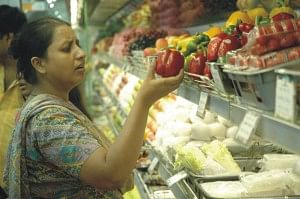International inflation

Prices: Going through the roof. Photo: Amirul Rajiv
EVERY one-dollar a household spends today on food, anywhere in the world, gets 90 to 95 cents worth compared to last year's price index. Food prices are continuing to soar, and within two/three months the prices of many items are bound to rise further due to unavoidable, and also manmade, reasons.
In Bangladesh, people blame local wholesalers for the price rise of food items, and there are genuine reasons for doing so. Some Bangladeshi traders are dishonest and do not miss any opportunity to raise prices on any pretext. Hoarding makes the situation worse.
Incompetent and corrupt officials often contribute further to the deterioration of the situation, rather than intervening correctly to arrest the price rise. To be fair in our analysis, we must admit that world market prices have also affected the situation.
There are a few reasons for price rise of food products worldwide, but the most important one is the rise in demand in the two most populous countries in the world, China and India. These two countries produce enough food, but with economic development their consumption habits are changing and they consume more food than ever before.
Production of food items in developed countries, especially staple foods such as rice, wheat, maize, sugar etc, after long stagnation, has got a new impetus due to alternative use of these items -- the production of ethanol, which is becoming a substitute for petrol in many developed countries.
This alternative use is also a way out for big farmers in developed countries for continuing their business vigorously again. Soon they will not have poor third-world countries as their customers, their products will be available in their own countries for producing ethanol.
The prospect is very bright indeed, and more acreage will be under use in future for producing more wheat, rice and sugar. The process will generate more work, more profit and more business expansion. Those third world countries that depend on staple food supply from the developed countries either as aid or at subsidised price must now produce their own food or die of hunger.
Vehicles driven by ethanol cause less pollution and are environment-friendly. Ethanol factories generate new business opportunities, new employment and, most importantly, can perhaps free the Western nations from their dependence on Arab oil.
Today, anybody who buys a car driven by ethanol or any environment-friendly fuel gets some subsidy in purchasing the vehicle in many developed countries. This is, in short, the key factor for price hikes of products like rice, wheat, maize, sugar etc.
Meat and milk price hikes, many consider, are due to increase in purchasing power of the middle class Chinese and Indian consumers, even though these two countries were not only self sufficient but also exported milk and meat products.
In EU countries, beef price is expected to increase in March by 20 to 40 percent due to a new action planned by Brussels, that has put an end to import beef from Brazil. Many believe that Brussels is invoking this measure to protect the British and the Irish beef producers.
The other reason for the price surge is speculations in stock markets worldwide, especially by stock market speculators in developed countries. Oil prise rise, the speculators forecast, will drive up the prices of everything, and that "everything" includes coffee, tea, cocao and even tobacco.
But hold on, please! The countries that produce these items never had any control on selling prices of their products before, nor will they have any influence on it in future.

 For all latest news, follow The Daily Star's Google News channel.
For all latest news, follow The Daily Star's Google News channel. 



Comments